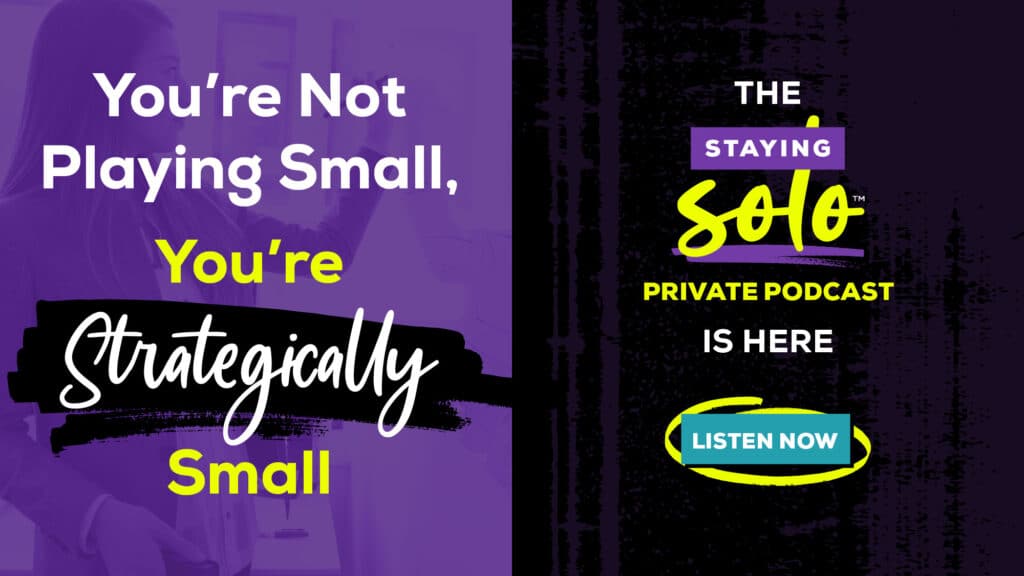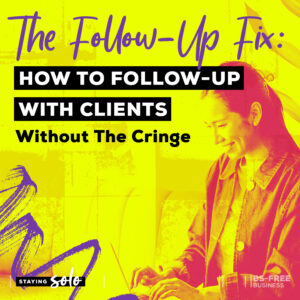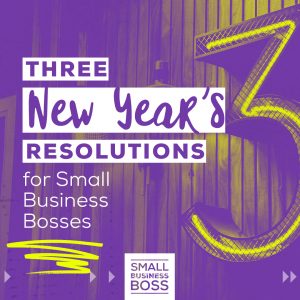
Search the site:
Should You Offer VIP Day Services?
Everyone is talking about VIP days, but are they right for you and your business? In this episode, we’re looking at everything you need to know to answer the question of whether you should offer VIP day services or not.
In the next two episodes, we will dive into two main delivery models for service business owners: VIP Days and Retainers. I wanted to talk about both of these as I answer many questions about them, and there are a lot of misconceptions out there.
Your business model is a service business, but your delivery model is “how” you deliver your services. And it’s common for people to have very strong opinions about which one you should use.
I mean, entire programs exist to teach service business owners a specific delivery model.
I want to preface what I will say in the next two episodes because I personally have offered both VIP days and retainers. They both have their merits, and my goal is to provide you with a balanced perspective so you can decide what’s suitable for you and your clients.
I’ve talked to way too many service business owners who are so stuck on using a specific delivery model that’s not working or thinking they need to switch because “everyone else is doing it.”
My goal is a bs-free look at both VIP days and retainers by exploring the good and the bad points of each. Ultimately, I don’t care what you decide; I only care that you decide based on the facts, not what’s trendy or what some coach who doesn’t even offer services told you to do.
In today’s episode, we’re talking about VIP Days and discussing everything you need to know to decide if it’s right for your business.
What is a VIP Day?
A VIP day, also known as an intensive or day rate, is about having a client pay you for a specific block of time in a specific time frame. For you as a service provider, a VIP day is a contained exchange of hours for a set amount of money. For your client, they get a faster result by working with you in an accelerated manner.
Don’t get stuck on the “day” part of it; sometimes, it’s a half day, and other times it’s a week.
Over the last five years, these have become increasingly trendy in online business, but I want to be clear that these are nothing new.
I’ve been doing day rates for corporate clients for over 20 years. This is a well-established way of packaging how to work with clients. It’s simply a specific amount of time, such as a day, to deliver the work.
They should have an agenda for the engagement, as well as a straightforward process to manage expectations for the day.
If you’re a copywriter, you may have a client book a day rate with you to get a series of emails or a sales page done. The client has your undivided attention to finish that project on the day they book.
Now, you may be wondering, what happens if the project doesn’t get done? VIP days require a very clear container and careful expectation management.
The deliverable is really and truly time, either working with you for the day (which is what a coach/consultant would typically do), working on a specific project (typically what a consultant/creative does), or some combination of both.
We’ll talk about the pros and cons of VIP days in a moment, but before you decide either way, I encourage you to consider how you can set it up so that you’re not overpromising what people will get. Expectation management is a critical part of any VIP day offer; otherwise, you will find yourself constantly navigating tricky client conversations.
The Promise of VIP Days
For coaches, creatives and consultants, the promise of VIP days is compelling. Honestly, I understand the appeal as it’s a contained offer where you can get in and out quickly. The speed at which you deliver what the client wants also means that you may charge more for your services than you would with a retainer or project engagement.
In preparing for this episode, I reviewed the messaging of multiple people who teach people how to set up VIP days for their businesses. A common thread in this messaging was pitting VIP days as an alternative to annoying retainer work and needy clients.
That’s a gross oversimplification! However, every good marketing message needs a villain, right? For service providers navigating less-than-ideal clients, VIP days seem to fix the situation.
Here’s the thing I want you all to think about. If you have issues with wrong-fit clients, managing deadlines and generally communicating with clients, does a VIP day fix those issues for you? In some cases, if you structure the offer, it has the potential to.
That said, I firmly believe that it doesn’t matter what your delivery model is; any issues you have with clients will follow you. This is why before you jump to a new way of doing things in your business, you need to focus on your client service, including boundaries and communications.
The other big promise of VIP days is that they’ll help you work less and live more. They will give you more time to do what matters to you, eliminate burnout and give you the freedom you started your business for.
Reading through these messages, they hit on the exact pain points of most business owners. However, those are BIG promises, which I don’t feel confident can be fixed through a different delivery model.
That may seem pessimistic, but I prefer to think of it as being realistic. These are the same promises widely made in the online business world yet often fail to materialize because there’s no one way to run your business.
The other reason I question these claims is that VIP days they require you to be booking clients every single month. That means you’ll need to do a lot more sales and marketing.
You may work less doing client delivery, but your other activities in your business will need to ramp up. Which, depending on your current audience, target market, skills, and more, may prove to be challenging.
Doing some quick math here, let’s say you need to book three VIP days per month to meet your income goal. Let’s say you choose to work 11 months per year, so that’s 33 clients per year you need to book. You’ll probably have repeat clients, so assuming five clients that book twice during the year, you still need 28 new clients yearly.
For some of you, that may feel very doable; for others, it may seem completely unrealistic. This absolutely should be a consideration when assessing if the VIP day model is the right way to deliver your services.
What Can You Offer?
There are many options for structuring VIP days and what you could offer.
While we call them a VIP day, you don’t necessarily have to be a day. It could be a week, a few days, or a half-day. For the past three or four years, I’ve been offering a half-day intensive for service business owners that combines a call with me and then done-for-you consulting services called the BS-Free Intensive.
This offer has worked well for me as it’s the perfect mix of face time with the client and then getting in and rolling up my sleeves.
As a way to deliver services to your clients, VIP days can likely be used by most service business owners. I’ve seen coaches, consultants, creatives and agency owners use them in various ways.
For coaching or consulting, you could do a VIP day for your clients focused on your area of expertise. Maybe that’s a business plan, operations, client service, mindset, or something else entirely.
My friend Tanya Geisler, a leadership coach, offers the Star Tipping Intensive, either in-person or virtual. She has a clear agenda and explains the difference between the luxe in-person option and the virtual one.
For creative or done-for-you services, your VIP day, whatever your services are, can be packaged up into something you do for a client in a set amount of time. This could be branding, email, tech setup, design, writing, or anything else you may do. For creatives, I especially like turning a strategy offer into a VIP day if possible, as you can deliver quickly.
Cassandra Le, who runs the Quirky Pineapple Studio has started offering a VIP day focused on content creation. This is a way for her clients to work with her in person to batch photo and video content, so it’s done in advance.
Connie Holen from Pixality Design works with clients on a website in a week package to finish their site quickly.
Honestly, most things can be a VIP day offer. However, it needs to be something you can contain in the amount of time you’re selling.
What Do You Need?
You’ve got an idea, so now you need to work through the nuts and bolts of your VIP day. When thinking about this type of offer, it’s important to remember it’s a VIP offer, as in very important person, so this does not just pay me, I do work for eight hours, and that’s it.
A VIP day needs to deliver in terms of the client experience, which means you need to do the work to set up the offer, including:
The Offer
What are you doing to offer? What’s included? What results do you deliver?
Pricing
How will you price the offer? What’s your pricing strategy over time? How many hours on either side of the day/week will you need to account for? What are your hard costs for delivering the day?
The Agenda
What’s the structure of the day/week? What can the client expect? When do they need to be available?
Marketing Plan
What strategy and tactics will you use to bring new clients in the door consistently? Do you have an existing audience or community to start from?
The Sales Process
What does your sales process look like? What happens once someone expresses interest? Do they book a call? How do you screen them? What tools will you use? How will they book and pay for the session?
Onboarding
What are the critical steps in the onboarding process? What type of agreement will they sign? What does pre-work look like? What emails do they receive?
Communication
How will you communicate in the days leading up to the day? On the day of? How will you ensure a personal touch?
Offboarding
How do you wrap up the day? What are the deliverables? Can they follow up or not after your session? Do you send a thank you gift? How do you collect testimonials or ask for referrals?
Pros/Cons of VIP Days
One of my goals for this episode was to provide a balanced look at VIP days and cut through the hype of this delivery model.
To help wrap up this episode, I want to look at the pros and cons of this type of offer.
The big pros for VIP days are that they’re time-bound, as you have a clear start and end with your client. It enables you to avoid the whole never-ending project situation that can happen with clingy clients.
Another pro for VIP days can be the higher price they can command as a client is paying for a faster result. However, this could do either way, as I see a lot of entirely overpriced VIP days, and no amount of speed can justify that price for me. (Good for people booking out at that price, but there’s some definite online business BS pricing.)
Now, let’s talk about the cons. The big one for me is that these offers are pitched as a way to avoid burnout and create more freedom in your business and life. This doesn’t account for the fact that it can be highly challenging to manage your energy.
For example, maybe you book one VIP day per week, but if it takes you part of a day to prepare, then a full day with the client, and then a day to recover, and a day to market it, are you really any further ahead?
This comes down to personal preference of how you like to work. For some people bringing it for a single day is the ideal situation. For others, it’s completely unrealistic. As one of my friends asked me as I prepped for this episode, “what happens if I wake up that day and I’m low energy or depressed?”
It’s absolutely essential that you understand how you best work and the potential pitfalls of any delivery model. For some of you, for many reasons, VIP days may create more stress than it’s worth. Especially if you feel like you may end up in a situation that requires you to reschedule or juggle things around constantly.
This brings me to another potential pitfall. Can you deliver as promised on a set schedule? Are you able to ensure a final quality product?
I know that with consulting offers, I can quickly drop into consultant mode and deliver with not a lot of ramp-up. That’s why any intensives I do work for me.
That’s not true for my creative work. Some days the muse shows up, and other days there’s no way I can write a word. I don’t want that type of pressure on my creative work, as it has the potential to compromise what I’m able to deliver to the client.
Also in the con column is the marketing/sales activities needed for this type of offer. If you’re someone who doesn’t like marketing your business, don’t engage in magical thinking, where if you change how you deliver your services, it will all fall into place. The same goes if you struggle with sales, as you’re doing to have more sales conversations with VIP days than other options.
Remember the example where I talked about needing 28 new clients a year? That’s a lot of activity to generate leads and get them across the finish line, so while you work fewer days on client work, you’re likely trading a lot of that time for marketing/sales.
Real talk? I have an established platform, including multiple podcasts, an email list, a blog, and an Instagram account. I’m not confident I could sell 28 VIP days per year, even with that.
That’s why I recommend to clients that VIP day offers are in addition to their other services. They can ramp that up over time but not have the pressure of having to build that type of marketing machine and rely on it solely to get paid.
Here are a few final questions for you when exploring VIP days as a service:
- Will this work for me? What are my potential pros/cons?
- Do I want to do less client work and more marketing?
- Does this fit with how I work best?
- How will I manage my energy?
- Will this work for my target clients?
- Can I realistically deliver in the set timeframe?
- Will I be able to ensure quality work in this timeframe?
There’s no right or wrong answer regarding how you deliver your services, but whatever you pick, you must ensure it’s a fit for you and your clients.
In the next episode, we’re going to walk through retainers as a delivery model the same way we just did with VIP days. They get a bad rap (sometimes with good reason), but they can be the right choice for some service business owners.
Links for this episode:


I’m Maggie Patterson (she/her), and services businesses are my business.
I have 20+ years of experience with client services, am a consultant for agency owners, creatives, and consultants, and vocal advocate for humane business practices rooted in empathy, respect, and trust.
Read or Listen to the Latest
For Solo Business Owners

Growing a solo service business is tough.
It’s even harder when you’re bombarded with BS advice that steers you away from your values and why you started your business in the first place.
This is the podcast for solo creatives and consultants who want to remain as a team of one and have zero interest in the hustle and grind of typical business teachings.
Subscribe now and never miss an episode.
For Micro Agency Owners
Most podcasts for agency owners obsess over revenue growth as the ultimate success metric.

But here’s the truth: not everyone wants to make millions. Your goal might be to build a sustainable business that lets you have a life and doesn’t run you into the ground.
Join me as I spill my shameless confessions and share everything I’ve learned about building a micro agency that skips the BS of tired and typical agency teachings.
Follow Now on All Major Podcast Platforms








